
A think tank, or public policy institute, is a research institute that performs research and advocacy concerning topics such as social policy, political strategy, economics, military, technology, and culture. Most think tanks are non-governmental organizations, but some are semi-autonomous agencies within a government, and some are associated with particular political parties, businesses, or the military. Think tanks are often funded by individual donations, with many also accepting government grants.

The Council of the Baltic Sea States (CBSS) is a regional intergovernmental organisation working on three priority areas: regional identity; regional safety and security; regional sustainability and prosperity. These three priority areas aim to address the themes of sustainable development, environment, sustainable maritime economy, education, labour, culture, youth engagement, civil security, children's rights and trafficking in human beings.
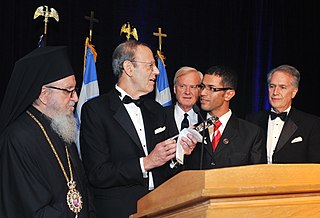
The National Endowment for Democracy (NED) is a quasi-autonomous non-governmental organization in the United States founded in 1983 with the stated aim of advancing democracy worldwide, by promoting political and economic institutions, such as political groups, business groups, trade unions, and free markets.
A crisis hotline is a phone number people can call to get immediate emergency telephone counseling, usually by trained volunteers. The first such service was founded in England in 1951 and such hotlines have existed in most major cities of the English speaking world at least since the mid-1970s. Initially set up to help those contemplating suicide, many have expanded their mandate to deal more generally with emotional crises. Similar hotlines operate to help people in other circumstances, including rape, bullying, self-harm, runaway children, human trafficking, and people who identify as LGBTQ+ or intersex. Despite crisis hotlines being common, their effectiveness in reducing suicides is not clear.
The International Foundation for Electoral Systems (IFES) is an international, non-profit organisation founded in 1987. Based in Arlington, Virginia, United States, the organization assists and supports elections and electoral stakeholders. Since 1987, IFES has worked in 145 countries and has programs in more than 50 countries throughout Asia-Pacific, Africa, Eurasia, the Middle East, and North Africa, and the Americas.
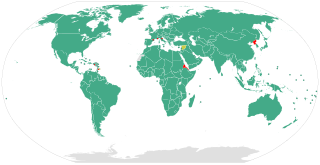
The United Nations Convention Against Corruption (UNCAC) is the only legally binding international anti-corruption multilateral treaty. Negotiated by member states of the United Nations (UN) it has been adopted by the UN General Assembly in October 2003 and entered into force in December 2005. The treaty recognises the importance of both preventive and punitive measures, addresses the cross-border nature of corruption with provisions on international cooperation and on the return of the proceeds of corruption. The UN Office on Drugs and Crime (UNODC) in Vienna serves as Secretariat for the UNCAC. UNCAC's goal is to reduce various types of corruption that can occur across country borders, such as trading in influence and abuse of power, as well as corruption in the private sector, such as embezzlement and money laundering. Another goal of the UNCAC is to strengthen international law enforcement and judicial cooperation between countries by providing effective legal mechanisms for international asset recovery.

The Nippon Foundation of Tokyo, Japan, is a private, non-profit grant-making organization. It was established in 1962 by Ryoichi Sasakawa. The foundation's mission is to direct Japanese motorboat racing revenue into philanthropic activities, it uses this money to pursue global maritime development and assistance for humanitarian work, both at home and abroad. In the humanitarian field, it focuses on such fields as social welfare, public health, and education. The foundation has also been criticized for promoting Japanese historical revisionism, particularly in whitewashing Japanese war crimes committed in World War II.

The International Federation of Red Cross and Red Crescent Societies (IFRC) is a worldwide humanitarian aid organization that reaches 160 million people each year through its 191 member National Societies. It acts before, during and after disasters and health emergencies to meet the needs and improve the lives of vulnerable people. It does so independently and with impartiality as to nationality, race, gender, religious beliefs, class and political opinions.
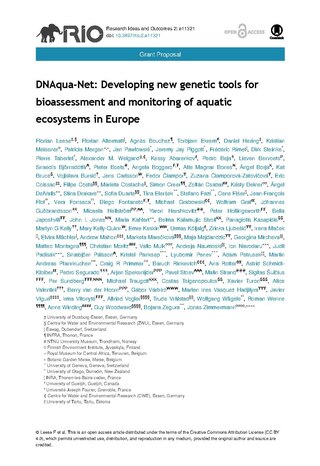
The European Cooperation in Science and Technology is running an EU-funded programme which enables researchers and innovators to set-up their own research networks in a wide range of scientific topics, called COST Actions. While COST does not fund research activities as such, it provides funding for scientific collaboration in the form of conferences, meetings, training schools and scientific exchanges.
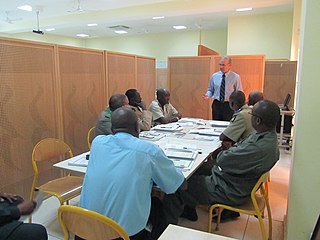
Democracy promotion, also referred to as democracy building, can be domestic policy to increase the quality of already existing democracy or a strand of foreign policy adopted by governments and international organizations that seek to support the spread of democracy as a system of government. In practice, it entails consolidating and building democratic institutions
Lifeline is a non-profit organisation that provides free, 24-hour telephone crisis support service in Australia. Volunteer crisis supporters provide suicide prevention services, mental health support and emotional assistance, not only via telephone but face-to-face and online.
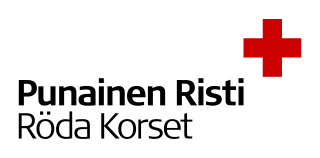
The Finnish Red Cross is an independent member of the International Federation of Red Cross and Red Crescent Societies, which is one of the biggest and best-known international organisations in the world and in the field of humanitarian aid. FRC has over 71,000 members and around 30,000 active volunteers in Finland. FRC consists of 12 regional chapters and 433 local branches throughout the country. The current General Secretary is Eero Rämö. At the end of 2022, the FRC employed 787 people, of which 204 worked at the headquarters in Helsinki.
State feminism is feminism created or approved by the government of a state or nation. It usually specifies a particular program. The term was coined by Helga Hernes with particular reference to the situation in Norway, which had a tradition of government-supported liberal feminism dating back to the 1880s, and is often used when discussing the government-supported gender equality policies of the Nordic countries, that are linked to the Nordic model. The term has also been used in the context of developing countries where the government may prescribe its form of feminism and at the same time prohibit non-governmental organizations from advocating for any other feminist program. In this sense it is possible to distinguish between a liberal state feminism found in Western democracies such as the Nordic countries, and a somewhat more authoritarian state feminism that is often also linked to secularism, found e.g. in certain Middle Eastern countries.
The Open Forum for CSO Development Effectiveness was the medium for a process led by civil society organizations (CSOs)between 2008 and 2012, to agree common principles and guidelines on CSO development effectiveness and bring the collective vision of organized people's groups into international development policy and practice.
The International Coptic Union is an international organisation that aims to unify the Egyptian Coptic community around the world in order to resolve any conflict or hardship that may be faced by any Christian community, generally, or the Coptic community, specifically. The Union was officially registered in 2014 at the United Nations as a Non-Governmental Organisation.
Foreign aid for gender equality in Jordan includes programs funded by governments or non-governmental organizations (NGOs) that aim to empower women, close gender based gaps in opportunity and experience, and promote equal access to education, economic empowerment, and political representation in the Hashemite Kingdom of Jordan.

South Africa–Sweden relations refers to the bilateral relations between Sweden and South Africa. Formal relations between the two countries began with the opening of a South African legation in the 1930s with relations being upgraded to ambassadorial level in 1994 following South Africa's first non-racial democratic elections. In 2000 a South African - Swedish Binational Commission was established by President Thabo Mbeki and Prime Minister Göran Persson.
American International Health Alliance (AIHA) is a nonprofit organisation aiming for assisting the global health. The organisation has managed more than 175 partnerships and project across the globe. In 2012, AIHA obtained the support of President's Emergency Plan for AIDS Relief [PEPFAR] project to strengthen the blood service in Central Asia, Ukraine, and Cambodia. Due to its structure based on the programmatic modal and dynamic condition, this organisation is suitable to assist the community or worldwide countries which have limited resources, and it is beneficial for sustainable evolution. AIHA is contributing to improve the worldwide health conditions. This organisation has been associated and largely contributed in the HIV-related area since 2000.
The National Institute for Social Development is the organization in charge of registering and monitoring nonprofit organizations in Mexico. There has been a steady increase in the number of charitable organizations registered since the 1990s. As of December 2017, INDESOL had registered a total of 38,363 charitable organizations.











